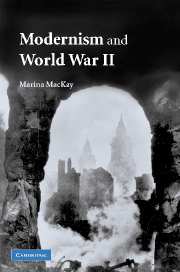Book contents
- Frontmatter
- Contents
- Acknowledgements
- Introduction: Modernism beyond the Blitz
- Chapter 1 Virginia Woolf and the pastoral patria
- Chapter 2 Rebecca West's anti-Bloomsbury group
- Chapter 3 The situational politics of Four Quartets
- Chapter 4 The neutrality of Henry Green
- Chapter 5 Evelyn Waugh and the ends of minority culture
- Coda: National historiography after the post-war settlement
- Notes
- Bibliography
- Index
Coda: National historiography after the post-war settlement
Published online by Cambridge University Press: 22 September 2009
- Frontmatter
- Contents
- Acknowledgements
- Introduction: Modernism beyond the Blitz
- Chapter 1 Virginia Woolf and the pastoral patria
- Chapter 2 Rebecca West's anti-Bloomsbury group
- Chapter 3 The situational politics of Four Quartets
- Chapter 4 The neutrality of Henry Green
- Chapter 5 Evelyn Waugh and the ends of minority culture
- Coda: National historiography after the post-war settlement
- Notes
- Bibliography
- Index
Summary
In their own fashion they cared deeply about politics, though not as politicians would have us care; they desired that public life should mirror whatever is good in the life within.
E. M. Forster, Howards End (1910)Our Vision of Life Rejected.
Title of Noel Annan's chapter on Thatcherism in Our Age (1990)Reviewing Angus Wilson's final novel in the New Statesman, David Lodge made the telling reproach that ‘art, in this novel, is so closely associated with hereditary wealth and privilege’ and that ‘the author's delight in high art and high civilisation has led him to be over-indulgent’ to his aristocratic main characters. Margaret Drabble expressed similar concerns in her review of the novel a week earlier when she warned her Listener readers that ‘it is risky, in 1980, to choose a titled family and a great house as one's subject, especially when one's message is essentially democratic’. These reviews speak revealingly of their moment at the end of the post-war settlement. In 1980, high culture and high society should be off-limits to any serious writer because of their old liability to get mixed up in one another.
- Type
- Chapter
- Information
- Modernism and World War II , pp. 142 - 156Publisher: Cambridge University PressPrint publication year: 2007



